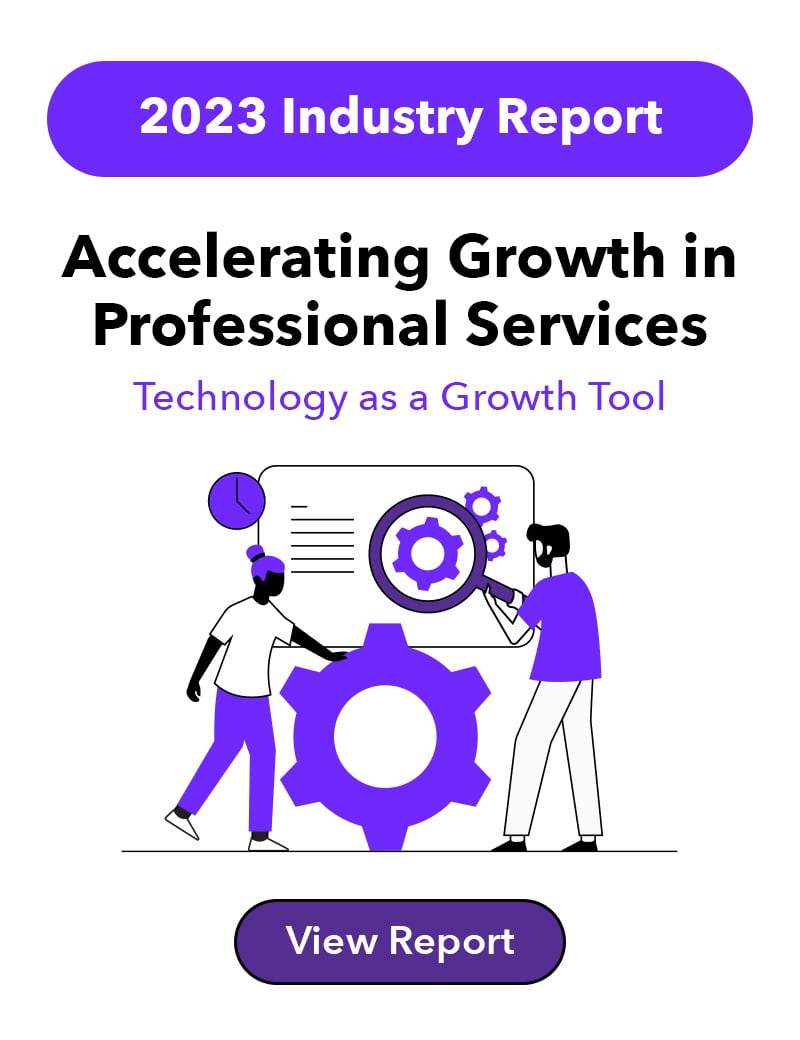Fully analog marketing strategies are no longer feasible, being pushed to the side by the explosion of digital transformation. With increasing demands for innovative marketing tactics and shrinking teams/budgets, technology is a crucial member of your marketing team. And an optimal marketing technology stack is the key to ensuring that you have all the tools you need to succeed.
A marketing technology stack, or martech stack, refers to the software and technology that marketing teams use to attract and retain customers, according to HubSpot. The tools included in your martech stack should save time by streamlining and automating processes while also providing analytics.
We recently uncovered in our industry-wide survey that most professional services marketing teams are lagging behind in terms of optimal tech stacks. So we're hoping that if you're in that same boat, this post can help you begin to fill in the gaps.
Why Having the Right Technology is Important for Marketing
Marketing has a tough job; it has to grow and adapt alongside a business’s changing goals. That means marketing may have to add team members, add more processes and solve even more complex programs. This only becomes an even harder feat when you are marketing professional services.
The right technology in your martech stack allows you to meet those challenges head-on. When teams choose the right marketing technology stack, they have an arsenal that enables them to strategize without wasting time on tedious tasks.
Must-Have Technology in Your Marketing Technology Stack
Social Media Management
Social media is one of marketing’s most powerful tools. According to Sprout Social, 55% of consumers learn about new brands on social and 78% of consumers are willing to buy from a company after having a positive experience on social.
An effective social media marketing strategy includes regularly posting content. Most marketing departments must post to multiple accounts, sometimes more than once a day. But if your team is doing this manually, you’re wasting hours of manpower on tasks that can easily be automated with a great social media management tool in your marketing technology stack.
A good social media management tool should:
- Post content in advance to multiple platforms from a single user interface
- Provide analytics for each post on each platform
- Offer brand campaign tools
- Offer communication tools
- Generate viable leads
Top social media management platforms include Zoho Social, Buffer, Hootsuite, Social Pilot and Sprout Social, according to Forbes.
Email Management
Email marketing is as strong as ever and should be included in your marketing technology stack. According to HubSpot, 99% of consumers check their email every day and it is by far the preferred way to receive updates from brands. With email marketing you can:
- Generate traffic to your site
- Increase leads
- Communicate with your audience
- Self-promote
- Collect feedback
And while email marketing can be done without email marketing software, the amount of time it would take would be counterproductive to your team.
One of the most valuable benefits of email marketing is being able to curate your own data list of media and contacts. Without email marketing software in your martech stack, filtering and sorting contacts would not only take hours but it would be difficult for employees to jump in and take over if the one controlling the list decides to go on vacation or leave.
According to Forbes, some of the most popular email marketing software includes Mailchimp, Zoho Campaigns, Drip, MailerLite, Campaigner, GetResponse and Moosend.
Content Management
Content management is another must-have addition to your marketing technology stack. Marketing content includes everything from educational materials, newsletters, eBooks, videos, webinars, blogs and every other type of marketing material.
The main focus of content marketing is reaching your target audience. Without a solid content management strategy, you could just be throwing all your content against a wall hoping it sticks to the right client. And your audience won’t engage with content that doesn’t feel natural to them.
When done well, content marketing has a number of benefits, according to HubSpot. It can:
- Educate your leads and prospects about your products and services
- Boost conversions
- Build relationships with your customers and increase loyalty
- Show your audience how your products and services solve challenges
- Create a sense of community around your brand
Having a great piece of content management software can direct your efforts. According to Capterra, great options for content marketing software include SalesForce, DivvyHQ, Maglr, Paperflite and MarketPage.
Data Management (and Insights)
Before you can develop a solid content management strategy, you need quality data. Data is what drives your content. And corresponding insights help you leverage your data to produce content that effectively speaks to your audience. That’s why data management tools are great non-marketing tool to add to your martech stack.
Every organization has loads of data at its disposal whether it is a list of billable hours, a Rolodex of client contact information or client retention rates. But many firms don’t use data to its fullest.
According to Transforming Data With Intelligence (TWDI), more than 80% of data that businesses generate goes unused. When you enable your data, you’re able to use it to its fullest, faster.
With data enablement tools like Pitchly’s data enablement platform, your data can help drive decisions about which clients to engage, where to place digital ads and how much time and money should go towards content assets.
Pitchly’s Data Productivity Suite automates repetitive work, like creating tombstones, CVs and bios, for marketing assets. The best part is by using a data enablement platform like Pitchly, your staff saves hours of time versus gathering all the data they need manually.
Start building a power marketing technology stack by adding social media management, email management, content management and data management tools. Pitchly can be your partner by helping you enable your data which makes all your other tools more effective.
See how it works by scheduling a demo today.
 Aug 9, 2022
Aug 9, 2022




